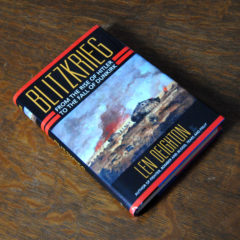
Len Deighton’s Blitzkrieg is a focus on the many pieces of innovation, lessons learned, battles fought and won that lead to blitzkrieg, which “was quite different from anything ever experienced in previous wars.”
Deighton doesn’t go into much about the origin of the word, but he doesn’t mince words when describing what the short success of the blitzkrieg has been made of in hindsight where he writes “German triumphs in this campaign have caused their military recklessness to be hailed as genius, their dangerous gambles to be thought of as miracles.”
From the rise of Hitler and the Nazi party, the evolution of technology in the interwar period, that’s the period of time between World War I and World War II, and most importantly the evolution in military strategy on both sides of World War II.
But what is more prescient to someone, like me, who isn’t a World War II-buff nor a military history nut, is that there are quite a few universal truths that arise within the pages of Blitzkrieg. The first example is “No man is in a hurry to conclude that the skills and knowledge to which he has devoted a lifetime are obsolete.” While this was truer back then, the pace of change has become such that very few fields allow anyone to devote a lifetime to anything.
Other examples are:
“For a narrow front nullifies the advantage of strength; two strong men can hold off a battalion of infantry if they are fighting in an office corridor.”
“For there is no weapon or vehicle of war that is not vulnerable to some other device or warrior.”
“…in war one must not take common sense for granted.”

Seeing as how the only World War II history books I’ve read were the one’s Deighton wrote before this one, I can say that this one is not overtly technical unlike Fighter: The True Story of the Battle of Britain which dives into technical details, this book stays more to concepts and strategy than hard technical specifications. While that information is within this book it’s not overwhelming.
This isn’t an easy read, I’m not sure many books on war are, but it’s not a difficult read. It’s educational and informative, and Len Deighton once again proves he can correct anyone, with footnotes to correct quotes that are wrong and even sections of the book where he went to visit the sites. In this regard, Deighton is a teacher that can educate anyone who’s willing to pick up his book, and in this class, he’s teaching about Blitzkrieg.
Read the Secret File of technical information and quotes from Blitzkrieg by Len Deighton.